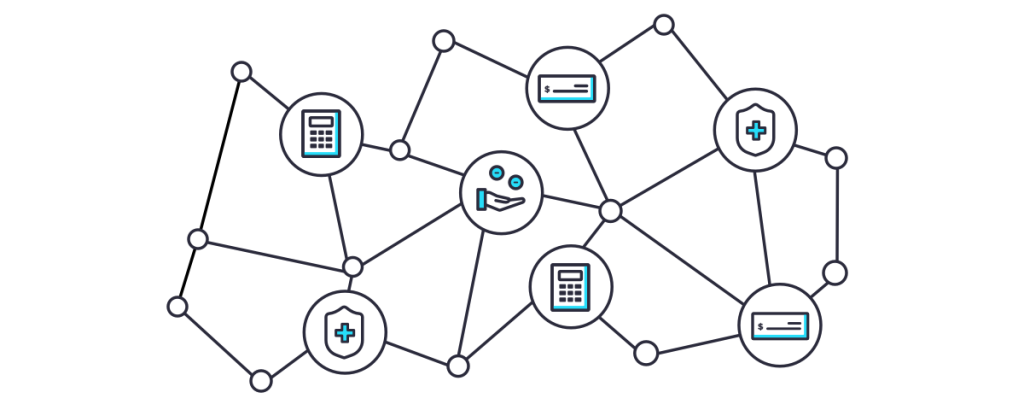In the digital age, where data integrity, security, and transparency are essential, blockchain technology has emerged as a transformative force, affecting industries from finance to healthcare. Blockchain protocols are the foundation upon which blockchain networks are built, enabling decentralized, secure, and transparent data management. Whether you’re a developer, investor, or simply curious about how blockchain works, understanding blockchain protocols is key to navigating this revolutionary technology. This article will delve into the concept of blockchain protocols, their types, importance, and their growing role in various industries.
Defining Blockchain Protocols
At the most basic level, a blockchain protocol is a set of predefined rules that govern how data is transmitted, validated, and stored within a blockchain network. It defines how the blockchain’s participants (often called nodes) communicate with one another, ensuring that everyone adheres to the same standards for transaction validation, data integrity, and security.
Here’s what blockchain protocols typically encompass:
- Consensus Mechanisms: These rules determine how the network agrees on the state of the blockchain and validates transactions. Examples include Proof of Work (PoW), Proof of Stake (PoS), and more.
- Data Structure: Blockchain protocols define how blocks are structured, what kind of data they can contain, and how they are linked to one another.
- Smart Contracts: Some blockchain protocols, like Ethereum, enable the use of smart contracts—self-executing code that runs when certain conditions are met.
Unlike traditional centralized systems, blockchain protocols operate in a decentralized manner. In centralized systems, a single authority (e.g., a bank or government) controls the network and ensures security. Blockchain protocols distribute this responsibility across all nodes, removing intermediaries and reducing the risk of single points of failure.

Key Features of Blockchain Protocols:
| Feature | Description |
|---|---|
| Decentralization | No central authority manages the network; nodes share equal responsibility for security and data. |
| Transparency | Most blockchains provide transparency by making transaction histories publicly available. |
| Security | Cryptographic algorithms and consensus mechanisms ensure the integrity and security of transactions. |
Blockchain protocols are essential for creating the decentralized trust that allows blockchain to operate securely without a central authority. The combination of cryptographic techniques and consensus mechanisms ensures that transactions are accurate and immutable.
Types of Blockchain Protocols
Blockchain protocols are tailored to different use cases and needs. They generally fall into three categories: public, private, and consortium blockchains. Each offers distinct advantages and disadvantages, depending on the required level of security, transparency, and permissioned access.
- Public Blockchain Protocols
Public protocols are open to anyone. They allow users to both read and write data, making them highly transparent and democratic. Anyone can participate in validating transactions and ensuring the network’s security. This type of blockchain is often used for cryptocurrency networks, such as Bitcoin and Ethereum, where decentralization and transparency are priorities.
- Examples: Bitcoin, Ethereum
- Consensus Mechanisms: Public blockchains typically use PoW or PoS, both of which require network participants to solve complex mathematical problems to validate transactions.
| Public Protocols | Private Protocols |
|---|---|
| Open to everyone | Access restricted to approved participants |
| Higher transparency | Controlled, with limited visibility |
| Slower transaction speed | Faster and more efficient transactions |
| Example: Bitcoin, Ethereum | Example: Hyperledger, Quorum |
- Private Blockchain Protocols
In contrast, private protocols are restricted to specific users or organizations. Only authorized participants can access and modify the blockchain. These blockchains are typically used for enterprise solutions where confidentiality is paramount, such as in supply chain management, healthcare, and finance.
- Examples: Hyperledger, Quorum
- Consensus Mechanisms: Private blockchains can use simplified consensus mechanisms such as Practical Byzantine Fault Tolerance (PBFT), which is faster and more efficient than PoW or PoS.
- Consortium Blockchain Protocols
A consortium blockchain is a hybrid between public and private. It’s controlled by a group of organizations rather than a single entity or the entire public. Consortium protocols are commonly used in industries where multiple organizations need to collaborate while still maintaining some degree of control, such as banking and insurance.

The Importance of Blockchain Protocols
The role of blockchain protocols goes beyond mere functionality. They ensure trust, transparency, and security in decentralized systems. The decentralized nature of these protocols means there is no single point of control, and all participants adhere to the same set of rules, thereby mitigating fraud and manipulation risks.
Benefits of Blockchain Protocols:
- Security: Blockchain protocols use advanced cryptographic methods and consensus mechanisms to ensure the authenticity of data and transactions.
- Trustless Environment: These protocols allow users to engage with the network without the need for trusted third parties, which reduces the potential for corruption or censorship.
- Immutability: Once data is added to the blockchain, it cannot be changed or tampered with, providing a reliable and permanent record.
Real-World Applications of Blockchain Protocols
Blockchain protocols have found applications across a wide range of industries:
- Finance: Cryptocurrencies like Bitcoin and Ethereum use blockchain protocols to facilitate peer-to-peer transactions without the need for intermediaries, such as banks.
- Healthcare: Blockchain protocols can ensure that medical records are securely stored and accessed only by authorized parties, maintaining patient privacy.
- Supply Chain Management: Blockchain protocols are used to track the provenance of goods, ensuring transparency and accountability throughout the supply chain.
List of Common Consensus Mechanisms
- Proof of Work (PoW): Miners solve complex mathematical puzzles to validate transactions and create new blocks.
- Proof of Stake (PoS): Validators are chosen based on the number of tokens they hold and are willing to “stake” as collateral.
- Delegated Proof of Stake (DPoS): Token holders vote for a small group of delegates to validate transactions and secure the network.
Blockchain Protocols and Smart Contracts
Smart contracts are self-executing contracts with the terms of the agreement directly written into code. Protocols like Ethereum are designed to support these smart contracts, enabling more complex operations beyond simple transactions. This has led to the rise of Decentralized Applications (dApps), which run on blockchain protocols to offer services such as decentralized finance (DeFi), gaming, and more.
Popular Blockchain Protocols Supporting Smart Contracts
- Binance Smart Chain (BSC): A faster and cheaper alternative to Ethereum, widely used in decentralized finance (DeFi).
- Ethereum: Pioneer in smart contracts, allowing developers to create decentralized applications.
Interesting Links
- Investopedia – article covers the fundamental workings of blockchain technology, explaining how blocks are linked together and the mechanisms that maintain security.
- Mudrex – provides a detailed explanation of blockchain protocols, describing different layers, like Layer 1 for core blockchain functionality and Layer 2 for improving scalability.


